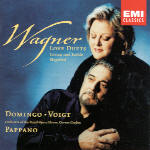This recording is mostly a positive experience: Both singers are in excellent voice, and it’s actually not all that jarring to listen to two such big, “bleeding chunks” of Wagner’s operas. The Tristan duet concludes with a concert ending written by the composer. There is no interruption (or high B-natural for Isolde); rather the two sing together and all ends harmonically well. Deborah Voigt is a fine Isolde, coloring her words with just the right amount of dreaminess, and the same might be said about Placido Domingo’s Tristan. Neither singer has the steely sound we’re accustomed to in this music, but I’m not complaining. Violetta Urmana adds a few nice sounds of her own as Brangane. In the final duet from Siegfried, Voigt is glorious, changing vividly from warrior-goddess to just-a-babe-surrounded-by-fire, with ringing tone at all levels and registers. Domingo, on the other hand, sounds as if he’s sight-reading. Granted, it’s not easy to find depth in Siegfried and so there’s nothing for Domingo to wrap his mind around–but all of the virility in the world doesn’t make up for completely empty note-spinning. Throughout, Antonio Pappano’s leadership is exemplary (and never pokey) and the orchestra plays handsomely. [8/26/2000]
































